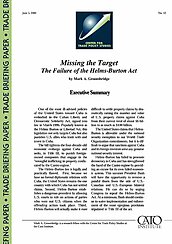One of the most ill-advised policies of the United States toward Cuba is embodied in the Cuban Liberty and Democratic Solidarity Act, signed into law in March 1996. Popularly known as the Helms-Burton or Libertad Act, this legislation not only targets Cuba but also punishes U.S. allies who trade with and
invest in Cuba.
The bill tightens the four-decade-old economic embargo against Cuba and seeks, in Title III, to punish foreign-owned companies that engage in the“wrongful trafficking in property confiscated
by the Castro regime.”
The Helms-Burton law is legally and practically flawed. First, because we have no formal diplomatic relations with Cuba, the United States remains the one country with which Cuba has not settled claims. Second, Helms-Burton establishes a dangerous precedent by allowing U.S. courts to rule on actions of parties who were not US citizens when the offending action took place. Third, Helms-Burton will actually make it more difficult to settle property claims by dramatically raising the number and value of US property claims against Cuba from their current total of about $6 billion to as much as $100 billion.
The United States claims that Helms-Burton is allowable under the national security exemption to our World Trade Organization commitments, but it is difficult to argue that sanctions against Cuba and its foreign investors serve any genuine national security interest.
Helms-Burton has failed to promote democracy in Cuba and has strengthened the hand of the Castro regime by providing an excuse for its own failed economic system. This summer President Bush will have the opportunity to remove a painful thorn from the side of U.S.-Canadian and U.S.-European bilateral relations. He can do so by urging Congress to repeal the Helms-Burton Act. At a minimum, Bush should continue to waive implementation and enforcement of the most egregious provisions stipulated in Title III of the act.

This work is licensed under a Creative Commons Attribution-NonCommercial-ShareAlike 4.0 International License.

